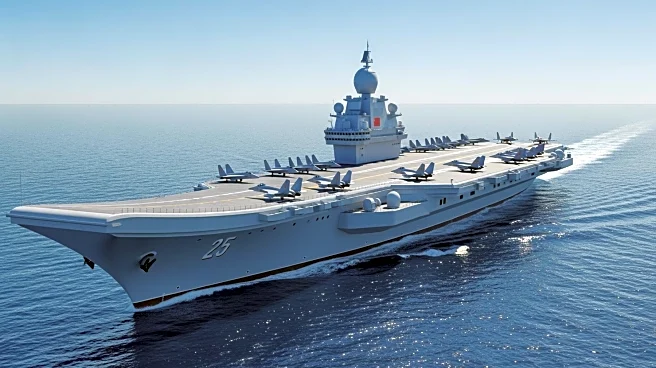What's Happening?
China has officially commissioned its third aircraft carrier, the Fujian, marking a significant advancement in its naval capabilities. The Fujian is equipped with electromagnetic catapult launchers, a technological leap that allows it to project power
deeper into the Pacific Ocean. This development positions China as the world's second-largest operator of aircraft carriers, trailing only the United States, which operates 11 carriers. The Fujian is China's first domestically designed carrier, following the Liaoning and Shandong, which were based on foreign designs. The carrier's electromagnetic catapult system enables it to launch fully-loaded warplanes, enhancing its operational range and firepower. However, the Fujian lacks nuclear propulsion, limiting its range compared to U.S. carriers.
Why It's Important?
The commissioning of the Fujian represents a strategic shift in China's naval power, potentially altering the balance of military influence in the Indo-Pacific region. With the ability to operate farther from shore, the Fujian enhances China's capacity to assert control over disputed waters such as the East China Sea, Taiwan Strait, and South China Sea. This development could heighten tensions with neighboring countries and the United States, which views China's military expansion as a challenge to the international order. The Fujian's capabilities may also influence regional security dynamics, prompting other nations to bolster their own military assets.
What's Next?
China's naval expansion is likely to continue, with potential plans to develop nuclear-powered carriers in the future. This could further extend the operational reach of its navy, challenging U.S. naval dominance. The Fujian's commissioning may lead to increased military activity in contested areas, prompting responses from regional powers and the United States. Diplomatic efforts to address territorial disputes may become more urgent as China's military presence grows. Additionally, advancements in carrier technology could spur innovation and competition among global naval forces.
Beyond the Headlines
The Fujian's commissioning underscores China's ambition to become a leading global military power. This development may influence international arms races, as countries seek to match China's technological advancements. The carrier's capabilities could also impact global trade routes, as increased military presence in strategic waters may affect shipping lanes. Furthermore, China's focus on domestic carrier design reflects its broader goal of reducing reliance on foreign technology, which could have long-term implications for global defense industries.















